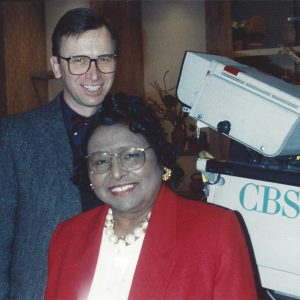calsfoundation@cals.org
August House
August House, a commercial book publisher founded and run by Arkansans, was a fixture on the national scene for its twenty-five years in the state. Originally a publisher of poetry, it moved into general fiction and eventually folklore and storytelling.
In 1978, two young Arkansas poets, Ted Parkhurst and Jon Looney, started a company to publish Arkansas poetry. They called their enterprise August House Publishers. Parkhurst quit his job to run the fledgling company, even selling his poetry door-to-door. Looney soon left Little Rock (Pulaski County), but Parkhurst stayed, and August House Publishers began to grow. By 1979, it became apparent that literary publishing interested writers in Arkansas and the region, and August House published six titles, including poetry by Looney, Parkhurst, Roger Armbrust, and Mary Jo Eaton. It also served at first as a contract publisher for some authors, publishing county histories, church histories, and the like.
In 1982, the company published novels by Little Rock residents Phillip McMath and Russell Murphy, as well as John Fergus Ryan of Memphis, Tennessee. Ryan’s novel, The Redneck Bride (1982), was edited by Liz Smith, who had joined August House in 1982 as its first editor. The next year, Liz Smith and Parkhurst married. In 1986, August House also published Jack Butler’s novel Jujitsu for Christ. The novel was favorably reviewed in the New York Times Book Review, and film rights were sold to comedian Henry Gibson. This national recognition and the interest from Hollywood did much to establish August House as more than a regional publisher.
As editorial director, Liz Smith Parkhurst took August House into the field of folklore because of her own interest in the subject. She invited W. K. McNeil, folklorist at the Ozark Folk Center in Mountain View (Stone County), to propose a series of works on Southern folklore. McNeil worked as general editor of the series, Liz Parkhurst oversaw acquisitions, and Ted Parkhurst marketed. Notable titles in the series were John O. West’s Mexican-American Folklore (1988), which is still used in colleges; Simon Bronner’s American Children’s Folklore (1988), winner of the top Opie Prize for children’s folklore; and W. K. McNeil’s Southern Mountain Folksongs (1993).
In 1987, Ted Parkhurst signed bookstore representatives to represent August House from coast to coast. This helped in making the publisher a national institution and increased sales considerably. August House’s offices moved from the Parkhurst home to a small office on West 2nd Street and, later, to a larger office on West 3rd Street. By the late 1980s, it had become a vital company with a staff of six located in Little Rock’s River Market District.
Arkansas-oriented titles dominated the decade, including How We Lived: Little Rock as an American City (1984) by F. Hampton Roy, Charles Witsell Jr., and Cheryl Griffith Nichols; The Best of the Arkansas Traveler (1986), collected columns from the Arkansas Gazette’s Ernie Deane, Charles Allbright, Mike Trimble, and Bob Lancaster; Thirty Years at the Mansion (1985), Liza Ashley’s recipes from the Arkansas governor’s mansion, a Washington Post bestseller during President Bill Clinton’s inauguration; Fireflies in a Fruit Jar (1988) by John Workman, with Sally Crisp; and The Steps We Took (1990), written by Little Rock’s Joe McQuany and edited by Sally and Huey Crisp, which became an international bestseller with nineteen printings of over 10,000 each. August House continued its regional focus in order to maintain its position as a publisher interested in and accessible to Arkansas writers.
In 1989, Ted Parkhurst began a partnership with the National Storytelling Festival and published the works of professional storytellers, such as Telling Your Arkansas Stories (1993) by Donald Davis; The Storyteller’s Start-up Book (1993) by Margaret Read McDonald; Sitting Down to Eat (1996), written by Bill Harley and illustrated by Kitty Harvill; and Ready-to-Tell Tales (1995) by David Holt and Bill Mooney. For several seasons, the August House catalog was headlined “Storytelling,” and Ted Parkhurst estimated that he represented the company at more than 450 library, storytelling, and folklore events, including Book Expo America, American Folklore Association, and the Popular Culture Association.
At the end of the 1990s, August House launched LittleFolk, an imprint of children’s picture books. The LittleFolk imprint caught the attention of Marsh Cove Productions, an Atlanta company, in 2004, and the Parkhursts sold August House to them in 2005 but stayed on as company executives. When Marsh Cove bought it, August House had published more than 600 titles. Three hundred and sixty-four were active titles at the time of the sale. In late 2006, the Parkhursts retired, and operations moved to Atlanta, where August House Publishers still exists.
During its twenty-five years as an Arkansas institution, August House was the only publisher in the state that had a national sales force, that was consistently represented at national trade shows, and whose books were reviewed nationally.
For additional information:
August House. http://www.augusthouse.com/ (accessed April 22, 2022).
Huey Crisp
Little Rock, Arkansas
 Ted Parkhurst
Ted Parkhurst  Ted Parkhurst of August House
Ted Parkhurst of August House 




Comments
No comments on this entry yet.